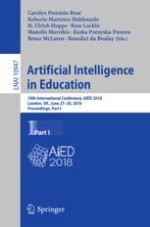2018 | OriginalPaper | Chapter
Metacognitive Scaffolding Amplifies the Effect of Learning by Teaching a Teachable Agent
Authors : Noboru Matsuda, Vishnu Priya Chandra Sekar, Natalie Wall
Published in: Artificial Intelligence in Education
Publisher: Springer International Publishing
Activate our intelligent search to find suitable subject content or patents.
Select sections of text to find matching patents with Artificial Intelligence. powered by
Select sections of text to find additional relevant content using AI-assisted search. powered by
